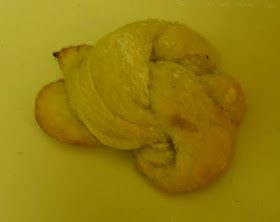First, the starter. I made my starter with plain flour and water in equal amounts. I fed it each day between 1/2 and 1/4 cup of each. I used filtered water, because I am not sure if our water has chlorine. That can kill your starter, and I didn't want to risk it. After a week, it looked like this:
This is soon after a feed. The top was bubbly and it smelled sour. (Sour enough that John asked, "What is that? Can I throw it away?" In the background you can see the cloth I use to cover the jar -- it's actually a flat-fold diaper. Since I use prefolds, those flat fold diapers have been doing all kinds of useful work for me -- they're a lot like cheesecloth, which is what was recommended.
I mixed together 1 1/2 cup starter, 1 1/2 cup flour, and 2 tablespoons olive oil, as recommended. The recipe said I might need to add water to get a "soft dough." But my dough looked like this:
It was not forming a ball, and it was not even reasonable to expect me to knead it. I kept adding more flour in little sprinkles as I stirred it with a wooden spoon, but if I'd had half a brain I probably would have just dumped in another half cup at least. It definitely needed it. Later I realized that the writer of the recipe dumps out the separated liquid at the top of her starter, though she says you don't have to do that. (Next time I will -- it made for a very sour taste, more than I wanted.) Obviously I had more liquid than she did, so I should have added more flour.
Here my two recipes conflicted. One wanted me to form the dough first and then let it rise, and the other said to rise first, and then form. Seeing as I wanted a rather complicated shape which would need some handling, rather than a flat crust, I should have formed first and then done the rise ... but of course I didn't. Mistake #2. I let it rise for about five hours before forming the knots. The last batch got a little more of a rise, because I left them for awhile after shaping and before baking, and they were better than the rest. Next time I am certainly shaping them first!
Once the dough had risen, I got ready to shape the knots. The dough had not come close to doubling in size. I suspect my starter wasn't really ready. Maybe I should have let it rise longer, too. After all, sourdough needs to rise much longer than yeast dough.
As I tried to shape the knots, I discovered that the dough was much too wet to shape into anything. I had read that sourdough turns out better when it's wetter, but this was just ridiculous. My second batch didn't get shaped at all -- I just did blobs like drop cookies. My third batch, I added a lot more flour, and these were the ones that turned out the best.
This is the shape you're going for:
The first batch got baked for 15 minutes at 450 degrees. Then the fire alarm went off and John came over to wave a towel at it. The second time he had to do it, he asked me to please stop whatever I was doing. So the next batch was baked at 350, but for much too long, and they were pretty well ruined. They were like little rocks. The third batch got 350 degrees for 15 minutes and were the best off. So that is the time and temperature I recommend.
The insides of the first batch, I thought at first weren't done, because they were so dense. I thought that was doughiness -- but it was really just failure-to-rise.

They tasted good though!
Last step: put knots in a bowl with a drizzle of olive oil and garlic salt (or chopped garlic and coarse salt). Toss them around to coat.
Here are the directions I would recommend following.
Bake at 350 degrees for 15 minutes, or until light brown.
Cool enough to handle, then roll in olive oil and garlic salt (or crushed garlic and coarse salt). They're best while they're still warm.





Garlic knots are a staple of NY pizzerias, too. Ah, I grew up loving them; they're great things to fill you up when you aren't up for buying lots of slices and you want finger food. =) It's a challenge to find ones without a crunchy outside, though.
ReplyDeleteYours look delicious. Never thought of using sourdough before.
Warning: they do taste a bit different. Not too crunchy, though, in my opinion (except for the overcooked batch).
ReplyDelete